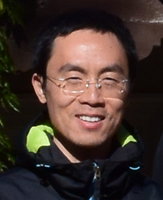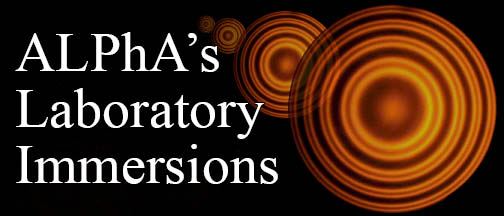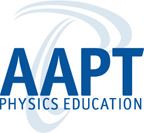- Home
- What We Do
- Laboratory Immersions
- Immersions 2023
- Imm2023USD_Geant4
Virtual Immersion
Geant4 Simulation of Radiation Detection
Dates: May 18, 2023 to May 20, 2023
Number of setups available: NA
Maximum number of participants: 10
------------------------------------------------------------------------------------------------------------------------------------------
 Geant4[1] is a set of C++ libraries for the simulation of the passage of particles through matter. It is widely used in high energy, nuclear and accelerator physics, as well as medical and space science.
Geant4[1] is a set of C++ libraries for the simulation of the passage of particles through matter. It is widely used in high energy, nuclear and accelerator physics, as well as medical and space science.
It is also a perfect educational tool to teach various aspects of radiation detection and particle physics as it enables the visualization of invisible particle tracks (right figure) and statistical analysis of distributions of particle energies, locations, momenta, etc. It can be used to simulate existing radiation detectors in a lab, or by itself without any complicated experimental apparatus.
No executable is provided in Geant4. Users must write their own C++ main functions to use functions defined in Geant4 libraries, compile them into executables, and then use them to perform simulation. This results in a very steep learning curve. Geant4 is hence normally introduced in physics curricula not until graduate schools.
In this three-day immersion, we will start with the installation of Geant4 libraries, followed by the compilation of GEARS[2], a tiny C++ main function written to demonstrate the usage of Geant4, and finally simulations of typical radiation detectors or any participant specified apparatus.
Installation of Geant4 on Windows
Compilation of Geant4 on Mac or Linux
Day 1, afternoon:
Compilation of a Geant4 main function
Geant4 user interface (graphic and command line)
Day 2, morning:
Construction and visualization of detector geometry
Day 2, afternoon:
Simulation of common particles passing through matter
Simulation of typical particle detectors
Day 3, morning:
Statistical analysis of simulation results
Day 3, afternoon:
Optionally, advanced topics (optical photon tracking, decay chain, etc. for example)
Optionally, participants specified simulations
By the end of the immersion, the participants should be able to set up Geant4 simulation environment in lab computers, develop a simulation that suits local students’ needs most.
The only required equipment of this immersion is a laptop running Windows or Mac, with a preference on Windows as most lab computers run Windows. There is no extra cost on software. Every program to be used is free of charge.
[1] https://geant4.web.cern.ch/
[2] https://github.com/jintonic/gears
 Dr. Jing Liu is an associate professor at the
University of South Dakota with 20 years of experience on experimental
particle physics, ranging from electron-positron collider to neutrino and dark
matter detections. He has systematically developed a series of undergraduate
and graduate courses on computational tools commonly used in high energy physics
and particle physics experiments. Those courses are well received by students.
In addition, he is exploring alternative course material delivering channels,
such as summer schools, workshops, and online platforms. His YouTube channel,
https://www.youtube.com/@physino, dedicated to the introduction of Geant4
simulation has accumulated 88,100 views, 3,800 hours of view time from
6170 viewers from more than 50 countries.
Dr. Jing Liu is an associate professor at the
University of South Dakota with 20 years of experience on experimental
particle physics, ranging from electron-positron collider to neutrino and dark
matter detections. He has systematically developed a series of undergraduate
and graduate courses on computational tools commonly used in high energy physics
and particle physics experiments. Those courses are well received by students.
In addition, he is exploring alternative course material delivering channels,
such as summer schools, workshops, and online platforms. His YouTube channel,
https://www.youtube.com/@physino, dedicated to the introduction of Geant4
simulation has accumulated 88,100 views, 3,800 hours of view time from
6170 viewers from more than 50 countries.





